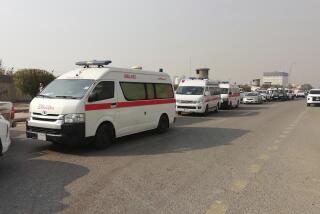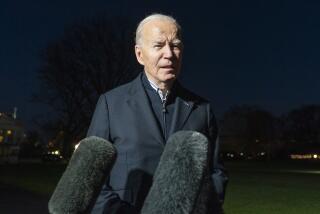Iraq suicide bomber kills 25 at Shiite-Sunni meeting
- Share via
baghdad -- As top Shiite and Sunni Muslim leaders broke their fast together in a symbolic show of unity Monday, a suicide bomber struck in their midst, killing as many as 25 people and injuring 40 in the turbulent city of Baqubah.
The attack apparently targeted Diyala provincial and tribal leaders who are part of U.S. efforts to forge an alliance against Sunni extremists, who once controlled large parts of the city 35 miles northeast of the capital.
Gov. Raad Tamimi was injured in the blast, which killed the Baqubah police chief, Brig. Gen. Ali Dilayyan, and other senior officials, Iraqi security officials said.
No Americans were killed, but two soldiers were wounded. They were treated and returned to duty. Lt. Col. Michael Donnelly, a military spokesman based in Tikrit, could not confirm casualty figures provided by Iraqi police.
The U.S. military has sought to replicate its progress in Anbar province, where violence decreased after an alliance of Sunni tribal leaders revolted last year against the Sunni militant group Al Qaeda in Iraq.
The tribal leader, Abdul Sattar Rishawi, was killed in a bombing this month, casting doubt on a strategy that U.S. commanders consider key to reducing the American troop presence in Iraq.
No one claimed responsibility for Monday’s attack, which bore the hallmarks of previous strikes by Al Qaeda in Iraq, a group that has claimed responsibility for killing Rishawi and other leaders who turned against it.
Iran, meanwhile, closed its border with northern Iraq in an apparent bid to step up pressure for the release of one of its nationals detained by U.S. forces last week, officials in the Kurdish autonomous region said.
Leaders of Diyala’s government, security forces, major tribes and former insurgents had gathered at a mosque in the mostly Shiite Shiftah neighborhood of Baqubah to discuss ways to ease sectarian tensions and defend the region against extremists.
Witnesses said the bomber detonated explosives strapped to his waist as participants were washing their hands in the mosque courtyard after sharing a meal to break the daylight fast that is a tradition during the holy month of Ramadan.
“The courtyard turned to pools of blood, and body parts were scattered everywhere,” Ahmed Kheshali, who attended the meeting, said by telephone. “We don’t know how it happened. There were at least three or four checkpoints” to get in.
Police in Diyala said they expected the casualty count to increase. The critically injured were evacuated to a nearby U.S. base for treatment while others were sent to the Baqubah Hospital, U.S. and Iraqi officials said.
The U.S. military has poured troops into Baqubah in a bid to drive out insurgents, who last year declared the city the capital of their self-declared Islamic caliphate and riddled its streets with bombs.
A series of offensives, aided by former insurgents, has reduced violence in the city. But tribal leaders say the Al Qaeda in Iraq militants remain entrenched in the surrounding palm groves and continue to launch major attacks on nearby villages.
In other violence Monday, a suicide truck bomber detonated explosives at a checkpoint run by Iraqi security forces on the road between Mosul and Tall Afar, killing six people and injuring 17, police said.
Police in Baghdad recovered the bodies of 12 victims of execution-style slayings.
The U.S. military reported the death of a soldier Monday from insurgent gunfire in Salahuddin province, north of the capital. At least 3,799 U.S. personnel have been killed since the start of the Iraq war in 2003, according to the website icasualties.org, which tracks military deaths.
The closure of five Iranian border posts threatens to stop the flow of food and other essentials into Iraq’s Kurdish region, said Dana Ahmed Majeed, governor of Sulaymaniya. The region is the most stable and prosperous in Iraq.
Officials at Iran’s ministries of interior and foreign affairs could not confirm the reported closures. But Iran’s provincial authorities sometimes wield power over local security forces and could have closed the border without notifying the central government.
Majid Ghafori, the governor of Iran’s Kermanshah province, which borders northern Iraq, had threatened Sunday to shut the border if Mahmoud Farhadi, identified by Iran as a regional customs official, was not released.
U.S. forces detained Farhadi in Sulaymaniya on Thursday, accusing him of providing weapons and training to Shiite militiamen on behalf of Iran’s Revolutionary Guard.
Five other Iranians were detained on similar charges this year in the Kurdish city of Irbil. Tehran maintains they are diplomats and says it is not supporting militants fighting U.S. forces in Iraq.
Iraqi President Jalal Talabani, a Kurd, insisted Saturday that Farhadi was part of an official delegation invited by local authorities.
Kurdish officials said they were being forced to pay the price for the standoff between Washington and Tehran. Iran is a key trading partner for the landlocked Kurdish region, and hundreds of trucks cross their border every day.
The U.S. military said its forces in Baghdad killed one man and detained four others during clashes Monday with rogue Shiite militants allegedly backed by Iran in Sadr City.
A military statement said the troops struck a cell accused of kidnapping and other attacks and were confronted by small-arms fire and bombs.
--
Times special correspondent Ramin Mostaghim in Tehran and special correspondents in Sulaymaniya, Mosul and Baghdad contributed to this report.
More to Read
Sign up for Essential California
The most important California stories and recommendations in your inbox every morning.
You may occasionally receive promotional content from the Los Angeles Times.













